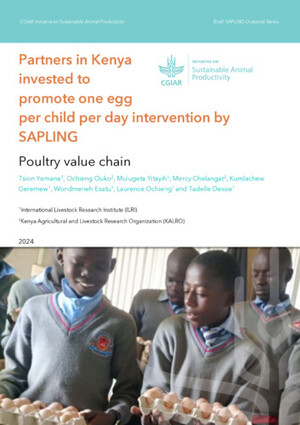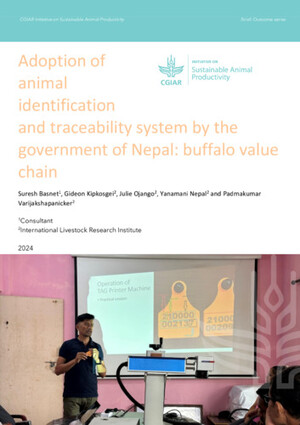
The role of food systems in improving maternal and child nutrition in challenging African low-income settings
Abstract
Purpose
Overcrowded cities in developing countries present challenging environments for health, where zoonoses and food safety are difficult to control. Whilst animal source foods (ASF) have a well-recognized role in nutrition of vulnerable populations, their availability, safety and quality are often compromised, and nutrition outcomes are rarely considered in livestock studies.
We developed and tested a framework to study the association between consumers’ access to and use of different ASF and livestock value chains, and poor nutritional status, to inform decisions on interventions and policies.
Methods
This multidisciplinary study combined quantitative and qualitative methodologies to address unexplored linkages between value chain and nutrition. 205 households and 222 retailers in two Nairobi slums were surveyed to 1) measure consumption and undernutrition; 2) examine ASF role in adequate diets using linear programming; and 3) investigate value chain links with nutrition. For each ASF, consumption patterns, acceptability factors of products and retailers, demand variation with price and availability (expansion potential of value chain) were combined to provide a holistic picture and identify target chains.
Results and conclusions
74% of the children and 26% of the women were anaemic, and had low intakes of several micronutrients. Linear programing analysis indicated that food-based interventions could ensure women’s dietary adequacy for women, for all of these nutrients except iron, as long as intakes of milk and other ASF could be increased from median intakes. Milk was the most consumed ASF (98.5% of the households, 5.5 times/wk). Demand for beef was least sensitive to changes in its price and its supply chain had limited expansion potential. Demand for chicken was more responsive to price changes while its supply chains could be expanded quickly. Consumption was often based on ‘taste’ and ‘nutrition’, indicating a potential role for nutrition education.
Relevance
Nutrition sensitive agriculture being key to fight malnutrition, we will show the importance of the value chain approach to assess feasibility and upscaling of safe ASF food system-based interventions.
Citation
Dominguez-Salas, P., Alarcon, P., Häsler, B., Grace, D., Alonso, S., Ferguson, E., Cornelsen, L., Fèvre, E.M. and Rushton, J. 2015. The role of food systems in improving maternal and child nutrition in challenging African low-income settings. Presented at the 14th conference of the International Society for Veterinary Epidemiology and Economics (ISVEE), Merida, Yucatan, Mexico, 3-7 November 2015. Nairobi, Kenya: ILRI.









